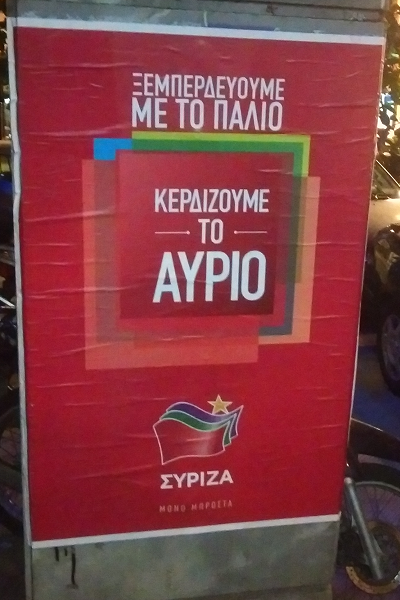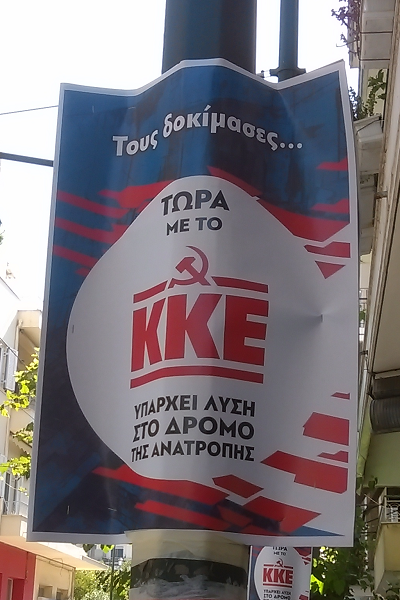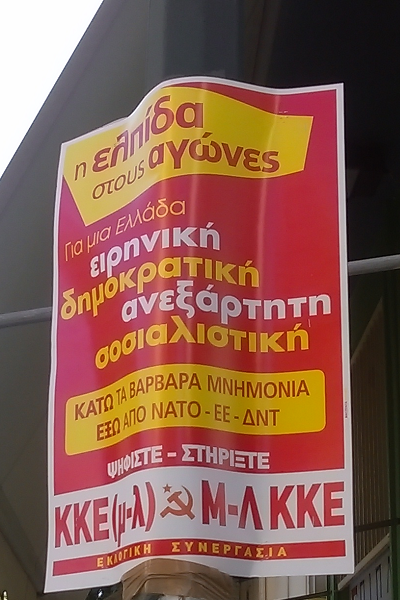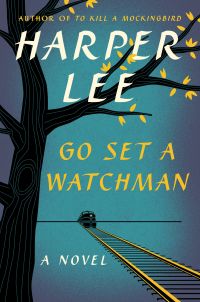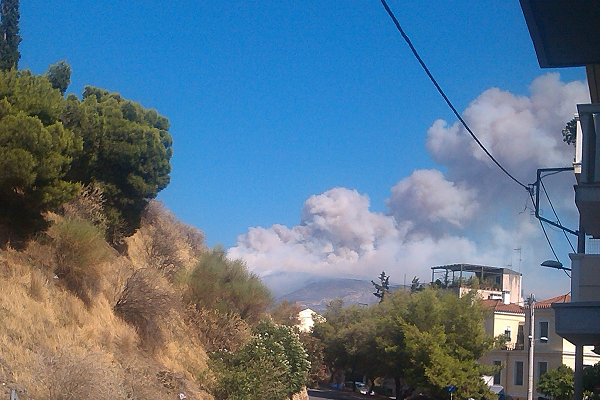Thirteen years ago, my wife Dimitra wrote a children’s story about a magical kite for the teacher training course she was doing in England. Today is Clean Monday, a day when Greeks traditionally fly kites, and next week she would have turned forty, so I thought it’d be nice to publish the story. I think it is very good.
Chapter One
Somewhere in the middle of Greece there lies a big, flat plane; and on the edge of it, where the river meets the sea, there is a little town, where I lived for a few months, years ago. And in that town, a long time ago, before I ever moved there, there lived a little boy and a little girl, not much older than you are now.
Their names were Nicholas and Ellie, and they had lived across the street from each other their whole lives. They had met when they were babies, in the park, and their mothers joked that they had hardly spent any time apart since. They were usually together; and when they weren’t, they were usually to be seen standing on their balconies (most houses and flats in Greece have balconies), communicating in a strange sign language of their own invention. They were the best of friends.
Nicholas was a few months older than Ellie, and he had changed most of his front teeth already. And so had most of Ellie’s classmates at school. Ellie was beginning to think that she would be the last one to lose a tooth, if it would ever happen, that is. Some days, she wondered if it ever would. And then one day it did, just like that, really, and Ellie found herself with a brand new hole in her mouth and tooth in the palm of her hand. Now I have to tell you that the Tooth Fairy doesn’t work in the same way in Greece. Children don’t put their teeth under their pillows, and there is no money involved; instead they throw their tooth on the roof and make a wish. And this is just what Ellie did.
Or at least this is what she wanted to do, but then her grandma had said that you need a proper tile roof for this to work, and Ellie had got worried: their block of flats only had a flat roof. But her dad shook his head and took Ellie up the stairs to the top of the building, from where you could see the sea, and the mountain, and the setting sun, and Ellie had thrown her tooth high up in the air, and, on a whim, wished that she could fly like it had. On the way down, her dad told her not to worry, because the wishes of those that believe come true sooner or later, in some way or another.
That day went by and nothing happened; then another, and another one. By the third one Ellie had all but forgotten about her wish, but someone, somewhere, must have still remembered, because that evening, when her dad came home, he brought with him a present for Ellie. It was a kite, but not just any kite: it was the most beautiful kite Ellie had ever seen. It was yellow and orange and red, with a star in the middle, and it seemed to shine like the sun. It looked completely out of place in Ellie’s bedroom, between the bookcase and the bed. It looked like it just couldn’t wait to fly. Ellie couldn’t wait either.
Never before had Ellie jumped out of bed so early on a Saturday morning, or eaten her breakfast so fast. She was nearly out of the door when her dad stopped her.
“Oh, Ellie? There’s one thing you have to remember.”
Ellie thought it would be something about staying away from trees and wires, but no. What her dad said was very, very different.
“This is not an ordinary kite. It is magical.”
“How do you know?” was all that she managed to say in her surprise.
“The man who sold it to me told me so,” he said. And then he added:
“He wore the greenest hat you can ever imagine, and he smoked a pipe that smelled like a garden in the spring.” As if that settled that.
Speechless, Ellie nodded and left. When she told Nicholas about it, he seemed to contemplate it for a while, and eventually he said: “let’s try it out then”.
And so they did. They stood a good distance from each other, in the direction of the wind. One held the kite, while the other held the string, and at the moment the first one let go, the other started running. It took a few attempts, but eventually the kite was up, sailing in the blue light of the morning and the breeze. The children spent the morning taking turns to hold its string, look up at the sky and feel the wind in their hands.
And although neither of them could put it into words, the truth is that they had never before felt as happy as they did when they were holding on to that string. The world looked a little different when they did, bigger, full of discoveries to be made and adventures to be had and stories to be told. They wished the morning would never end, but of course it did. Their mothers appeared on their respective balconies and called them in for lunch, and Nicholas and Ellie had no choice but to tie the kite’s string on a fence post and go in, promising to each other that they’d be back as soon as possible.
The kite, however, had different plans. He was enjoying flying very much, so much, in fact, that didn’t ever want to stop flying.
“I,” he said to himself, “was made to fly. I don’t belong in a bedroom, between the bookcase and the bed. I belong up here, between the shining sun and the bright blue sky. And I am never going back there. No. I am going to see the world!” And he set off to do just that.
Chapter Two
The kite closed his eyes, made a wish, and tagged at his string three times; and with that, the knot was undone. Once free, he whispered a prayer to the four winds. The North Wind was the first one to appear.
“What is it that you want, young kite?” he asked.
“To see the world!” was the kite’s bold answer.
And so the wind blew and blew and the kite flew, higher and higher, faster and faster, further and further away, so that he was only a small dot in the sky when Ellie and Nicholas came back out. He flew over the sea, dotted with islands big and small, a country divided in two by a great river, surrounded by an even greater desert; then, as night fell, mountains and more mountains; and only when day began to brake again did the wind stop. The kite found itself looking at a village of small, square hats with pointed roofs, half-hidden by some trees, and a little boy with brown skin and curly hair who was looking right back at him!
The kite bowed, happy to have made a new friend, and the little boy got hold of his string. They spent the whole day together, exchanging stories. The little boy talked about his mother and sister, about the stories they told and the songs that they sang; but most of all he talked about his flute, how much he loved making music with it, and how sad he was that he had lost it. The kite told him about the sea with its islands, the coast with the beaches, the great river, the desert and the mountains. But eventually the night fell once more, and the little boy had to go home.
He tied the kite to a tree branch and promised to be back as soon as possible; but of course you all know what happened next…
The kite closed his eyes, concentrated, and tagged at his string three times, and with that, the knot was undone.
Once free, he whispered a prayer to the four winds. It was the West Wind that showed up this time. Without a word, he picked the kite up and started blowing. He blew and he blew, and the kite flew higher and higher, faster and faster, further and further away. All night the kite travelled, caught between the stars in the sky and the lights on the earth; and only when the sun came out did the wind stop. The kite slowly floated downwards, towards a small village perched on a mountain slope, on the edge of which a little girl and her goat stood, greeting the rising sun. When she saw the kite, she jumped and clapped her hands.
The kite bowed to her, and she got hold of the string, and told him all about her life: about her goat and her grandmother, and all the stories and the songs that she taught her. But most of all she talked about the doll that the grandmother had made for her when she had turned five, and how sad she was now that she had lost her. The kite told her about his night time journey, about the little boy and his flute, about the mountains and the desert, the river, and the sea with its islands. They had a great time together, and the kite caught himself thinking that it would be nice to settle down in a place so green, and have a goat for a friend. And yet, when the night fell and the little girl tied his string around a heavy stone, he didn’t hesitate.
He closed his eyes, concentrated, and tagged at his string three times, and with that, the knot was undone. Once free, he whispered a prayer to the four winds. It was the turn of the South Wind this time. He gave one look at the little kite, and he started to blow. He blew and he blew, and the kite flew higher and higher, faster and faster, further and further away. This was the longest journey the little kite had been on so far. For a whole night they travelled, but the wind did not stop when the sun came up. Instead they still flew and flew, over mountains higher than the kite thought possible, a sea, and then, great plains full of fields that seemed to go on forever, or until the night fell for a second time. More than once during that second night the kite wondered whether this wind would ever stop blowing; and in the end, he did. It was still dark when the kite found himself at the edge of a shiny, frozen forest.
At first the kite could not understand why the wind had left him there. There was nobody around. But as the light began to change he noticed a small building; and the sun came up, a child came out of the forest and knocked on the door, which was answered by a kind-looking man. Soon more children came, six in total — two girls and four boys. It was the last of those, the youngest boy, who noticed the kite and called to the others. Soon there were seven smiling faces looking up at him. Never had the kite been so happy to meet someone. He bowed, and another friendship began.
The children told him about their teacher, and their school, because that’s what the little building was. They talked about their games and their lessons, the stories that they heard and the songs they sang, but most of all they talked about their favourite books, and how sad they were because they had lost one of them. The kite told them about
the nights and the days of his journey; about the mountains and the plains, the river and the desert, and the sea with all its islands. He talked about the girl and her goat and, the little brown-skinned boy. Nightfall came all too soon on that day. The children went home, and it started to rain. Much as the kite did not like rain, he was sad to leave.
And yet, he closed his eyes, made a wish, and tagged at its string three times… only to realise he was not tied to anything this time. Instead, he found the teacher holding his string. “You have a long way to go still, little kite, don’t you?” he said as he let him go. With a heavy heart, the kite whispered a prayer to the four winds, and waited for the East Wind to come and take him away.
Chapter Three
If the kite had hoped to escape the rain, he had hoped in vain. Even though the wind blew and blew, and the kite flew higher and higher, faster and faster, further and further away, he never seemed to get away from it for long. It seemed to be raining everywhere in the world that night. And so the kite travelled through rain and clouds, sometimes even hail and thunder, and darkness worse than he had ever seen before. Only occasionally did he catch a glimpse of his old friends, the stars, through a hole in the clouds, and each time he felt a little better — but only a little. Eventually the clouds cleared, and the sun came out, and the sky turned a brilliant blue. And still the kite was travelling, high up in the sky, and the East wind didn’t seem to show any intention of slowing down and stopping. And, worse still, all he could see bellow was the sea, stretching out in all directions for as far as he could see. More than once, he wondered where he was going, or even if he was going anywhere. At long last, an island came into view, the wind slowed down, and the kite landed. It was an island unlike any other the kite had ever — and by this time, he had seen a lot. It seemed to float on the sea instead of being anchored to the sea bed, like other islands are. And there were no children on it, nor any people of any sort for that matter
And yet it was far from empty. In fact, it was full — full of things that looked as lost and lonely as the little kite felt. Toys of every kind and description; gloves and scarves; pencils and crayons; socks missing their pairs; the hat I forgot on the train to Bristol. All around were things that had once been loved by somebody, somewhere, but had come to be lost. They all had a story to tell. The kite recognised a flute, a doll, and a book of fairy tales. He sat there for a long time, listening to everybody’s stories, about the places they had come from and the people who had loved them and the lives they had lived with them, and even though the things weren’t sad, and the land of lost things, for this is what the island was, was not a sad place, the kite himself did feel sad — and homesick.
He thought of the man who made him, who smoked a wooden pipe and wore green shoes every day without fail, and of the little girl he had been given to, the little girl he belonged to, and he wished he could be back with her. And because he was no ordinary kite, because there was still some magic left inside him even after all his travels, the four winds, who had become quite fond of him by this time, swooped him up and took him back, back to the small town where he had come from. That journey was long, too, and it wasn’t easy: rain came once again, and the kite narrowly avoided getting hit by lightening once. But in the end the sun came out again, and the kite made it back, just as the rain cleared and a rainbow came out over the small Greek town where it had all began.
It was Nicholas who spotted him first, a dot in the distance getting bigger and bigger. And even though he looked very different from the last time they had just seen him –he was wrinkled and tattered, his tail was half the size it used to be, and the string was all but gone– the children were very happy to see him again, and began running in his direction. They ran and ran, and got to him just in time to see him land on a tree and hear the ‘crack’ as one of the sticks of its frame broke.
“We were too late,” Ellie said, and she nearly started to cry.
Nicholas did not say anything. He just stared at the man with the green hat and the pipe who seemed to have been there the whole time, watching.
“Is this your kite, little girl?” he asked.
Ellie nodded.
“I happen to know this kite really well,” he said. “And I know that he had had a very long journey. He had spent all his magic, and he was very tired. He needed to rest.
“But I know another thing too,” he went on. “I know that he spent his very last magic on a present to you. Before he died, he told all his stories to his friends, the four winds. And he made them promise that, if the two of you made another kite, the winds would whisper all the stories in his ears, so that he could, then, tell the two of you. That was his present to you, the children who taught him how to fly,” the man finished.
And that’s what happened. Nicholas and Ellie went back to the man’s workshop with him, which smelled like a garden in spring, and he helped them make another kite, which they took home and flew on every windy day. They never let him out of their sight, and neither did he leave them. And yet, every time he came down, he had another great story to tell.
